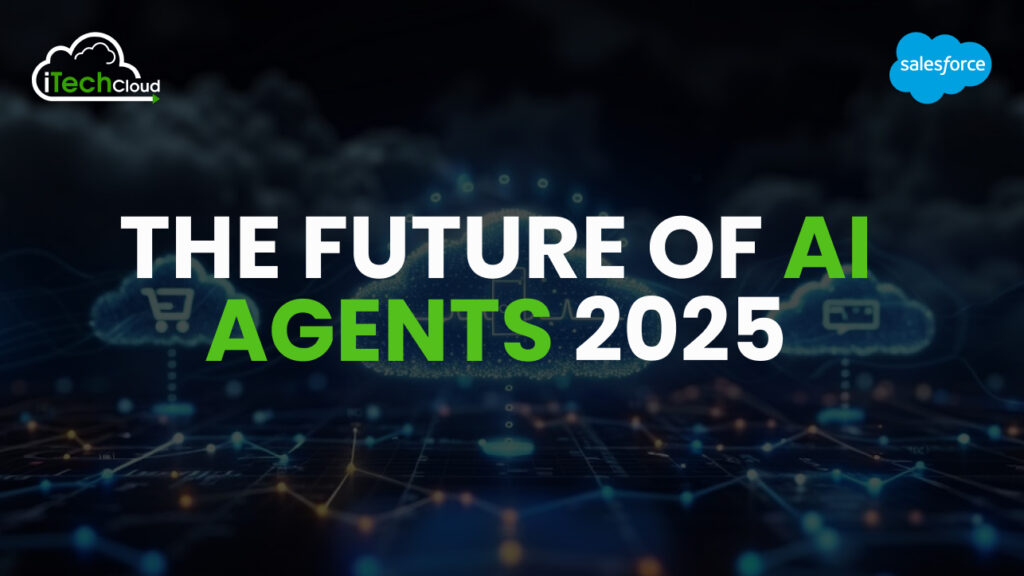The Future of AI Agents 2025

Artificial Intelligence (AI) has seen transformative advancements in recent years, and 2025 promises to be a landmark year in the evolution of AI agents. These agents autonomous systems designed to perform tasks, make decisions, and interact with humans are becoming smarter, more intuitive, and deeply integrated into various industries. This blog explores the potential of AI agents in 2025, highlighting their applications, challenges, and the ethical considerations that accompany their growth.
Table of Contents
1. The Current Landscape of AI Agents
AI agents are not a futuristic concept; they are already a part of our daily lives. Virtual assistants like Siri, Alexa, and Google Assistant have become household names, helping users manage schedules, answer questions, and control smart home devices. In businesses, AI agents drive chatbots, automate workflows, and analyze large datasets to provide actionable insights. The advancements in machine learning, natural language processing (NLP), and computer vision have laid a strong foundation for the next generation of AI agents.
2. The Capabilities of AI Agents in 2025
By 2025, AI agents are expected to achieve significant advancements in the following areas:
a. Contextual Understanding
AI agents will excel in understanding context, allowing them to deliver more personalized and relevant responses. This will be achieved through improved NLP models capable of comprehending nuanced language, emotions, and cultural differences.
b. Autonomy and Decision-Making
AI agents will operate autonomously with minimal human intervention. They will make complex decisions in dynamic environments, such as managing supply chains or navigating urban traffic.
c. Interdisciplinary Integration
AI agents will seamlessly integrate across various domains, from healthcare to finance, enabling cross-functional operations. For instance, an AI agent in a hospital could assist in diagnostics while also optimizing administrative tasks.
d. Human-like Interaction
The integration of AI with augmented reality (AR) and virtual reality (VR) will make interactions with AI agents more immersive. Virtual assistants may appear as holograms or avatars, providing a more engaging user experience.
3. Applications of AI Agents in Key Sectors
a. Healthcare
AI agents will revolutionize healthcare by assisting in diagnostics, patient monitoring, and personalized treatment plans. They will analyze medical records, detect anomalies in real-time, and predict health issues before they arise. Virtual health assistants will provide patients with round-the-clock support, reducing the burden on healthcare professionals.
b. Education
AI agents will act as personalized tutors, adapting to the learning pace and style of individual students. They will provide interactive lessons, track progress, and offer targeted feedback. AI-driven analytics will help educators identify and address learning gaps effectively.
c. Finance
AI agents will enhance financial services by providing real-time investment advice, detecting fraudulent activities, and automating customer support. Robo-advisors will leverage predictive analytics to offer tailored financial solutions, empowering users to make informed decisions.
d. Transportation
The transportation sector will benefit from AI agents in autonomous vehicles, traffic management systems, and logistics. These agents will optimize routes, improve safety, and reduce fuel consumption. Autonomous drones and robots will further enhance last-mile delivery solutions.
e. Retail
AI agents in retail will provide personalized shopping experiences through recommendation systems and virtual try-ons. They will also streamline supply chain operations and inventory management, ensuring optimal stock levels and faster delivery times.
f. Workplace Automation
AI agents will automate repetitive tasks, allowing employees to focus on strategic activities. They will act as virtual team members, assisting in project management, scheduling, and data analysis, thereby increasing overall productivity.
4. Challenges and Ethical Considerations
The rapid evolution of AI agents 2025 also brings forth challenges and ethical dilemmas that must be addressed:
a. Data Privacy
AI agents rely on vast amounts of data to function effectively, raising concerns about data privacy and security. Robust data protection measures and transparent policies will be crucial to gaining user trust.
b. Bias and Fairness
AI models are prone to biases present in training data, which can lead to unfair outcomes. Ensuring diversity in datasets and implementing bias detection mechanisms will be essential for ethical AI deployment.
c. Job Displacement
The automation of tasks by AI agents could lead to job displacement in certain sectors. Governments and organizations will need to invest in upskilling programs to prepare the workforce for AI-driven roles.
d. Accountability and Transparency
As AI agents become more autonomous, questions about accountability and decision-making transparency will arise. Developing frameworks to audit AI decisions and assigning responsibility will be critical.
5. The Road Ahead: Opportunities and Innovations
The future of AI agents 2025 is filled with exciting opportunities for innovation. Key trends to watch include:
a. Collaborative AI
AI agents will work alongside humans, enhancing their capabilities rather than replacing them. This collaboration will lead to new possibilities in creative industries, research, and problem-solving.
b. Edge AI
With advancements in edge computing, AI agents will process data locally on devices, reducing latency and enhancing privacy. This will enable real-time decision-making in critical applications like autonomous vehicles and industrial automation.
c. AI for Sustainability
AI agents will contribute to sustainability efforts by optimizing energy consumption, managing waste, and supporting climate change mitigation strategies. They will also play a role in developing smart cities with efficient resource management.
d. Ethical AI Frameworks
The development of ethical guidelines and regulatory frameworks will ensure the responsible use of AI agents 2025. These frameworks will address issues like data privacy, algorithmic transparency, and equitable access.
Conclusion
AI agents 2025 are poised to transform industries and redefine human-AI interaction. With enhanced capabilities, these agents will deliver unprecedented efficiency, personalization, and innovation. However, addressing the associated challenges and ethical considerations will be vital to unlocking their full potential. As we stand on the cusp of this AI-driven revolution, the collaboration between technology developers, policymakers, and society will determine the trajectory of AI agents and their impact on our world.

